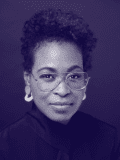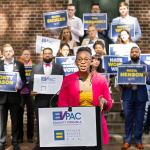We’re the only newsroom dedicated to writing about gender, politics and policy. Subscribe to our newsletter today.
The 19th was recently invited to interview President Barack Obama around a series of themes tied to his new biography, “A Promised Land,” published shortly after the 2020 election. Editor-at-Large Errin Haines engaged him on topics including voting rights, systemic racism, the pandemic and the women in his life.
Below are his written responses, chosen from several questions The 19th submitted in writing.
This interview has been edited for length and clarity.
Errin Haines: The pandemic has been economically devastating for women, particularly women of color, as millions have left the labor force, unable to balance raising children or taking care of older parents with their jobs. What became clear to you about gender inequity and the impact of the pandemic on women at work and at home? What can government do to help women get to a new normal? What should men do to disrupt this imbalance and be more equal partners?
President Obama: Women play a critical role in shaping economies, not just here in the United States but around the world. And if women aren’t participating in the workforce, it makes everyone worse off.
We’re seeing that right now. Over the last year, the pandemic has forced a lot of women to juggle working from home, online school and a lack of child care — on top of everything else they were already doing. They’ve found themselves in an impossible situation, and in many cases had to make a difficult choice.
We all have a role to play in reversing this trend. Government can help by mandating more parental leave and better pay to begin with. But those of us who are spouses and partners need to make sure we’re doing our part, too — sharing the load and helping our sons and daughters understand that marriage and parenting is a partnership.
You have daughters that have come of age in the Black Lives Matter movement, where many women leaders have emerged and where women have also been the victims of killings by law enforcement. Now that they’re older, what are the conversations you have with them? What did you discuss during last summer’s racial reckoning? Did they express an interest in protesting? Did they take any action?
I’m just incredibly proud of the kind of human beings Sasha and Malia have become.
Of course, like all of us, they followed the protests around our country. They got involved. And we had conversations about all of it. My advice to them is the same as it is to all young people, which is that protesting — raising public awareness, putting a spotlight on injustice, making the powers that be uncomfortable — that kind of civil disobedience couldn’t be more important. Throughout our history, that has often been the only way to get the political system to pay attention to marginalized communities.
But eventually, I tell them, movements have to be translated into laws and policies — and in a democracy, that only happens when we elect government officials who are responsive to our demands.
Basically, my advice is to reject the false choice between participating in protests and politics. Do both!
You wrote about how your wife was a reluctant supporter of your 2008 presidential bid, to put it mildly! But Mrs. Obama went on to become one of your most effective surrogates and among the world’s most beloved Americans and first ladies. How did she make you a better president?
Well, that’s easy — she was just herself. She’s still the same person I fell in love with, the same person who has always kept me on my toes, grounded our family and believed in us. I write this in the book, but I made a point to come home for dinner at 6:30 p.m. every night when we were in the White House. And Michelle and I would just fall into our routines as spouses and parents trying to raise a family and juggle our lives and our careers. We were living in a bubble for eight years, but at home Michelle and I were able to be ourselves with each other — and in many ways, I think that’s what got me through.
Did you or enough Americans realize during your 2012 reelection campaign the rising threat of voter suppression, or what would be the effect of the Shelby decision [which struck down Section 5 of the Voting Rights Act, a provision that required states with a history of voter disenfranchisement to submit changes to their voting laws for pre-clearance by the Department of Justice] in 2013?
As soon as Shelby was decided, we knew what was coming. That’s because we understood how important the Voting Rights Act was in terms of protecting access to the ballot box, especially the preclearance provisions that the Supreme Court had gutted. As Justice Ruth Bader Ginsburg wrote in her dissent, “Throwing out preclearance when it has worked and is continuing to work to stop discriminatory changes is like throwing away your umbrella in a rainstorm because you are not getting wet.”
In the years since, Justice Ginsburg has been proven correct. But the question now is what are we going to do about it? As I said at John Lewis’s funeral, we need to not only revitalize the Voting Rights Act, but to make it even better — by making sure every American is automatically registered to vote; by adding polling places, expanding early voting and ending partisan gerrymandering; by guaranteeing that every American citizen has equal representation in our government, including the American citizens who live in Washington, D.C., and in Puerto Rico, and the formerly incarcerated. And that’s only the beginning.
There are bills Congress could pass which would begin to restore our democracy. It’s time to pass those bills so President Biden can sign them into law.
You put two women on the Supreme Court during your time in office and you wrote about the value of one’s lived experience as an asset to their leadership. What can you say now about your decision to nominate Justices Sonia Sotomayor and Elena Kagan, and how their tenure on the court has reflected the empathetic approach you were looking for in the role?
When I met Justice Sotomayor, I saw someone who really embodied the American experience: She is a woman of color, raised by a single mom, and a person who experienced a lot of uncertainty in her life, but found a way to rise up through it all.
She’s also an outstanding legal mind — deeply thorough and fair. And all those things she’s experienced that make her who she is, they also make up what America is — and I believe the Court is better off with Justice Sotomayor on it.
I feel the same way about Justice Kagan. She’s the granddaughter of immigrants, the daughter of a schoolteacher, she grew up understanding the importance of service. And she’s always carried that with her — whether she was clerking for Thurgood Marshall or serving as dean of Harvard Law School.
I’m proud to have nominated both of them and to have played a small role in the larger change their legacies will create.
As a candidate, President Biden framed the election as “a battle for the soul of America” and is seeking to unite a deeply divided country. Are you more or less optimistic about whether that can happen, and why?
Look, there’s no doubt that the country is deeply divided right now — more divided than when I first ran for president in 2008. America has been fractured by a combination of political, cultural, ideological and geographical divisions that seem to be deeper than just differences in policy.
I think a lot of that has to do with changes in how people get information. I’ve spoken about this before, but if you watch Fox News, you perceive a different reality than if you read The New York Times. And those differences have been amplified by social media, which allows people to live in bubbles with other people who think like them.
Until we can agree on a common set of facts, until we can distinguish between what’s true and what’s false, then the marketplace of ideas won’t work. Our democracy won’t work. So, as citizens, we need to push our institutions in the direction of addressing these challenges.
But if anyone can help bridge our divides, it’s Joe Biden. He’s spent his life bringing people together. And as president, he’s been focused on beating back the pandemic and rebuilding our economy — ideas that Americans from both parties can support.







